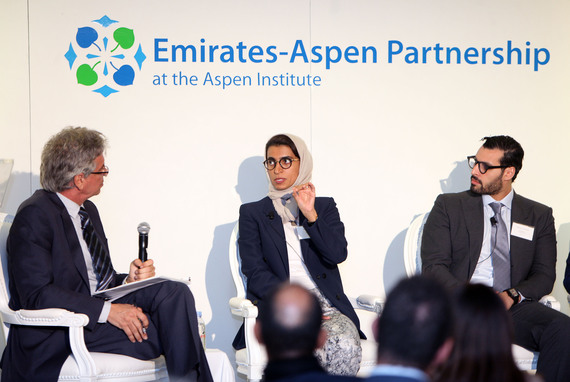 twofour54 CEO, Noura Al Kaabi, and Image Nation Chairman, Mohamed Al Mubarak, in conversation with producer Walter Parkes on June 11, 2014 in West Hollywood, CA.
twofour54 CEO, Noura Al Kaabi, and Image Nation Chairman, Mohamed Al Mubarak, in conversation with producer Walter Parkes on June 11, 2014 in West Hollywood, CA.
The Emirates-Aspen Partnership began a conversation on Abu Dhabi as a global film and media hub a little over two years ago. At that time we discussed assembling a toolbox to build out a robust ecosystem for Abu Dhabi's film and media sector. Among the most essential tools were visionary and creative leadership, strong government support, and thoughtful and dynamic international partnerships. By all accounts, the tools of that toolbox have been robustly filled, and the film and media ecosystem in Abu Dhabi today is dynamic and flourishing.
As part of a broader strategy to diversify its economy and create a 2030 vision for the UAE's future, the UAE has been quietly laying the groundwork for Abu Dhabi to leverage its story-telling tradition to become a regional and global leader in media, from developing dynamic and original content, to attracting premier Hollywood studios, to creating a global hub in the Middle East for film and TV production. This effort has been spearheaded, in parallel, by two incredible young Emirati leaders, Noura Al Kaabi, CEO of the Abu Dhabi Media Zone, twofour54, and Mohamed Al Mubarak, Chairman, Image Nation.
On June 11, 2014, Noura and Mohamed joined the Emirates-Aspen Partnership on stage in West Hollywood, California for an Aspen-style conversation with Hollywood industry veteran Walter Parkes, US Assistant Secretary of State for Economic and Business Affairs, Charles Rivkin, and British-Emirati filmmaker, Ali Mostafa. The conversation was dynamic and wide-ranging and centered on what it will take to sustain Abu Dhabi's emergence as a global thought leader in film and media.
In his remarks, Ambassador Rivkin emphasized we tend look at the Middle East through a security framework; however, economic policy is foreign policy, and efforts to create jobs will sow the seeds of regional stability. Ali Mostafa illustrated this point in describing how efforts to engage Emirati youth in all aspects of filmmaking have exceeded all his expectations and have formed the nucleus of the nascent, indigenous, and engaged film community in the Emirates.
The real takeaway of the night was the acknowledgment of the deepening partnership between Abu Dhabi and Hollywood as a two-way street that has evolved and to open up new and unexpected doors in production and content. Take the recent news that Disney selected twofour54 to line-produce the Star Wars VII portion in the UAE directed by JJ Abrams. Or Ali Mostafa's new film, From A to B, about three young Emirati men road tripping across the Middle East. Further, the incredibly powerful upcoming documentary by Image Nation and Participant Media on Malala Yousafzai and her fight for women's education, directed by Davis Guggenheim, is another touchstone of the development of the UAE film ecosystem.
Each of these projects is a testament to the maturity of the film sector in Abu Dhabi, and to the value of the sustained and creative partnership between the US and the UAE at all levels, underpinned by the robust support of UAE government entities. According to Al Mubarak, "these partnerships are not just seen as co-financing or production deals, they are becoming educational partnerships" which, according to Al Kaabi, will help Abu Dhabi "reach a level where we're the hub of creative content in the region."
But we can't forget that the partnership between Abu Dhabi and Hollywood did not happen overnight. It took years of relationship building, patient investment, and many long flights. And with the recent launch of nonstop service between Los Angeles and Abu Dhabi, I think we can safely say that we only have more to look forward to in the Emirates' project pipeline with the increased connectivity between the two hubs of creativity. It also goes to reinforce another tenet of foreign policy that can often be forgotten in 'this town': sometimes our best economic statecraft doesn't come from Washington.